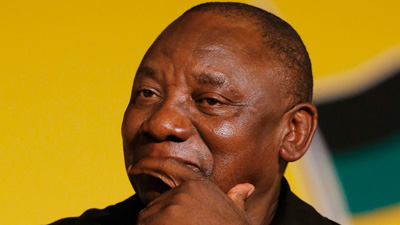“President Cyril Ramaphosa will probably be the single biggest vote winner for the ANC in next year’s general election, if all goes according to (his) plan”, says Mari Harris, Director and Political Analyst at leading research company Ipsos.
“This view is based on findings from Ipsos’ first ever Mobile Pulse poll which found that 82% of registered voters who have access to mobile phones currently approve of Ramaphosa’s running of the ANC.”
This is one of the important findings in an Ipsos Mobile Pulse opinion poll conducted on Tuesday 22 May. This Ipsos study was implemented by GeoPoll, the leading provider of mobile data collection in Africa. Interviews were conducted with 750 randomly selected registered voters in South Africa.
Currently about 92% of South Africans have access to mobile phones, thus collecting data via mobile phone as close as possible to the completion of the president’s first 100 days in office was essential.
There are signs of the so-called “new dawn” as almost two thirds (63%) of voters believe the country is going in the right direction since Cyril Ramaphosa became president while 9% think the country is going in the wrong direction. However, the president has his work cut out for him, as almost three in every ten voters (28%) are withholding their judgement and saying that they are “unsure”.
These findings are in stark contrast to November 2017, when two-thirds of South Africans in a national study indicated that they believed that the country was going in the wrong direction. (Ipsos Khayabus, Pulse of the People™, Wave 2 2017; a national study of 3,654 randomly selected personal face-to-face interviews.)
See the graph overleaf.

In November 2017 Cyril Ramaphosa received a rating of 6.07 out of 10 in the mentioned Pulse of the People™ study. This question was repeated in Ipsos Mobile Pulse: “Just judging on the last few months (since mid-February 2018) how many points out of 10 will you give Cyril Ramaphosa?” Currently the president’s approval rating is at 6.7 out of 10. He is definitely benefiting from being more prominent in the public eye.
| Points out of 10 | % |
| 1 | 4 |
| 2 | – |
| 3 | 4 |
| 4 | 5 |
| 5 | 13 |
| 6 | 16 |
| 7 | 17 |
| 8 | 21 |
| 9 | 7 |
| 10 | 12 |
| Not answered | 1 |
More questions were asked about the general performance of the new president and also of his handling of the economy:
| Approve % | Disapprove % | Unsure % | |
| “Do you approve or disapprove of the job Cyril Ramaphosa is doing as President of South Africa?”
|
76 |
6 |
18 |
| “Do you approve or disapprove of the job Cyril Ramaphosa is doing in handling the economy of South Africa?” |
79 |
6 |
15 |
With different factions still vying for positions and dominance in the ruling party, it is important to look at how registered voters see Cyril Ramaphosa’s style of running the ANC. In similar reactions to previous questions, 77% of voters approved of his style, while only 6% disapproved. Just less than one in every five registered voters (17%) are currently unsure.
What influence will the new man at the helm have on the ANC’s performance at next year’s general election?
Although it is still early days, one can possibly argue that election campaigning started last year with the ANC conference at Nasrec just before the end of 2017, thus the question: “How likely are you to vote for the ANC under Cyril Ramaphosa in the general election in 2019?” yielded important results
| % | |
| Extremely likely[1] | 28 |
| Likely | 24 |
| Neutral | 24 |
| Unlikely | 6 |
| Extremely unlikely | 19 |
Looking at the voters who are already convinced that they are likely to vote for the ANC in 2019, it adds to a small majority of 52% (countrywide[2]).
It is safe to say that those unlikely to vote for a Ramaphosa-led ANC 25% are firm supporters of opposition parties. However, almost a quarter of voters (23%) have not yet made up their minds and chose the “neutral” option. All political parties will be vying for these votes.
[1] The actual scale in the questionnaire read: “Extremely unlikely, Unlikely, Neutral, Likely and Extremely likely”
[2] Although registered voters from all provinces were interviewed in their correct proportions, the sample size of 750 is not big enough to do province-specific analysis.
Author
-
Multimedia Manager at SABC News · Wits - University of the Witwatersrand


